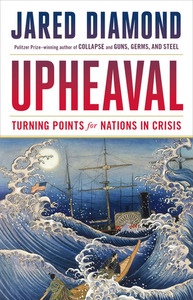You need to sign in or sign up before continuing.
Take a photo of a barcode or cover
challenging
informative
reflective
slow-paced
informative
reflective
slow-paced
I have read Diamond's earlier book Guns, Germs, and Steel and most of Collapse. I was curious about the theme of Upheaval.
I enjoyed reading Diamond's narrative histories of the countries he concentrates on: Finland, Japan, Chile, Germany, Indonesia, and Australia. Especially, I was interested in Finland because my family hosted a Finnish exchange student in 1969-70 when I was in high school and later my husband and I hosted her daughter. The same year I had a Finnish sister I was friends with the other exchange students at our school, who were from Japan, Germany, and Chile.
The concept of applying psychological concepts applied to personal crisis to nations is interesting. Diamond begins by sharing his own personal crisis over his career choice. He presents the factors that influence a person's ability to weather a crisis. I have to say that when he presents the application of these factors to national crisis my interest flagged.
I ended up not finishing the book.
I was given access to a free ebook by the publisher through NetGalley in exchange for a fair and unbiased review.
I enjoyed reading Diamond's narrative histories of the countries he concentrates on: Finland, Japan, Chile, Germany, Indonesia, and Australia. Especially, I was interested in Finland because my family hosted a Finnish exchange student in 1969-70 when I was in high school and later my husband and I hosted her daughter. The same year I had a Finnish sister I was friends with the other exchange students at our school, who were from Japan, Germany, and Chile.
The concept of applying psychological concepts applied to personal crisis to nations is interesting. Diamond begins by sharing his own personal crisis over his career choice. He presents the factors that influence a person's ability to weather a crisis. I have to say that when he presents the application of these factors to national crisis my interest flagged.
I ended up not finishing the book.
I was given access to a free ebook by the publisher through NetGalley in exchange for a fair and unbiased review.
informative
medium-paced
informative
slow-paced
I really enjoy Jared Diamond's writing and his previous books have been extremely interesting and fascinating. Upheaval has several interesting chapters and parts, but seems to drag on in the last third of the book as points of the book are rehashed over and over again. If you are not already interested in the topic and the examples used within the book, this could be an extremely tough read or book to complete. By his own admission, Diamond establishes the need for a more thorough examination of nations dealing with crisis, which could really add something to the ideas that Diamond shares in his book regarding how nations deal with their problems.
Diamond takes several countries experiences of upheaval and what was good and bad and lessons learned. Then tries to apply that to the present wolrd including the United States. Most of these histories are from countries for which Diamond has a personal collection. They are very interesting summaries of what transpired. However, Diamond comes up with a 16 point schematic of how a country adapts to an upheaval and this comes across as rather pedantic. Perhaps one would put up with this if you needed to get a good grade in his class.
He then tries to show this against the U.S. and how it might have troubles. As I usually run into there can be great analysis of the past but prescriptions to use in the future are rather useless.
He then tries to show this against the U.S. and how it might have troubles. As I usually run into there can be great analysis of the past but prescriptions to use in the future are rather useless.
I loved GG&S and Collapse, but I thought this book didn't quite measure up to those. Reading about each of the individual case studies was interesting, but trying to shoehorn each of them into his framework felt somewhat tedious and repetitive. Which is not to say there was anything wrong with his analysis, it just didn't make for particularly compelling reading.


